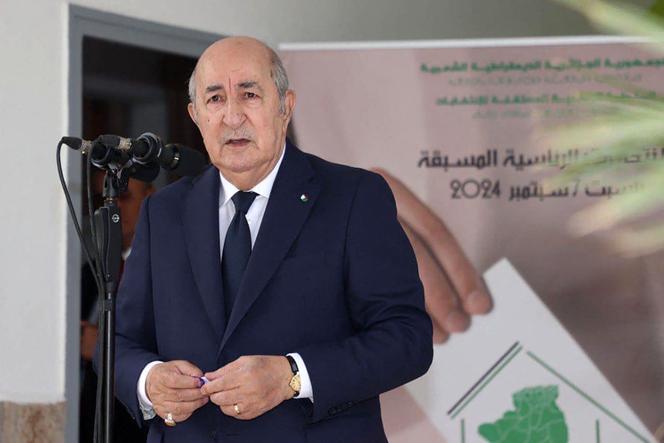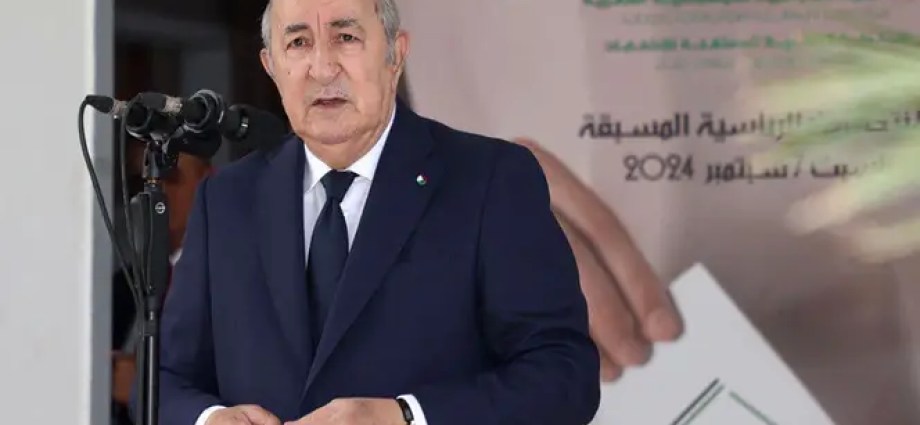Algeria’s President Tebboune Confirms Sifi Ghrieb as Prime Minister, Tasks Him with Forming New Government

In a significant political development, Algerian President Abdelmadjid Tebboune has officially appointed Sifi Ghrieb as the country’s Prime Minister, tasking him with the formation of a new government. The announcement was made via a presidential communiqué released on Sunday, September 13, confirming Ghrieb’s transition from interim leader to the full-fledged head of government.
A Swift Transition of Power
Ghrieb’s appointment comes just weeks after the abrupt dismissal of former Prime Minister Nadir Larbaoui on August 28. Larbaoui, who had held the position since November 2023, was replaced by Ghrieb, then serving as Minister of Industry. At the time, no official explanation was provided for Larbaoui’s removal, sparking widespread speculation about the underlying motives behind the sudden cabinet shake-up.
In a brief video statement following his confirmation, Ghrieb expressed gratitude for the president’s trust and outlined his priorities moving forward. “The President of the Republic honored me today by appointing me as Prime Minister and entrusting me with the formation of the new government,” he stated. “He provided me with all necessary instructions to prioritize serving the Algerian citizen and advancing the national economy to the ranks it deserves as a central state at the regional and international levels.”
Who Is Sifi Ghrieb?
Ghrieb brings a unique background to the role of Prime Minister. Holding a doctorate in materials physical chemistry, he has extensive experience in both academia and industry. Prior to his entry into politics, he served as Chairman of the Board of Algerian Qatari Steel, a joint venture between Qatar and Algeria. His technical expertise and managerial experience are expected to play a critical role in his approach to governance, particularly in steering Algeria’s economic policies.
His appointment signals a potential shift toward a more technocratic administration, one that may prioritize economic reform and industrial development. Given Algeria’s ongoing challenges—including reliance on hydrocarbon revenues, youth unemployment, and the need for diversification—Ghrieb’s background could prove invaluable.
Political Context and Implications
Algeria has experienced considerable political turbulence in recent years, from the Hirak protest movement that led to the resignation of long-time President Abdelaziz Bouteflika in 2019, to ongoing efforts to stabilize the economy and institutions under President Tebboune. The dismissal of Larbaoui and the swift appointment of Ghrieb suggest a desire for renewed momentum in addressing these challenges.
Analysts are watching closely to see what kind of government Ghrieb will assemble. Will he bring in new faces, or retain key figures from the previous administration? The composition of the cabinet may offer clues about the administration’s policy direction—particularly in areas such as energy, foreign investment, and public sector reform.
Public and International Reaction
Domestically, the move has been met with cautious optimism. Many Algerians are eager for tangible improvements in living standards and economic opportunity. Ghrieb’s emphasis on citizen welfare and national economic advancement aligns with these public expectations.
Internationally, Algeria remains a key player in North Africa and the Sahel, with influence in regional security, energy markets, and diplomatic circles. A stable and effective government in Algiers is crucial not only for Algeria’s future but for broader regional stability.
Looking Ahead: Challenges and Opportunities
Ghrieb faces a daunting task. Algeria’s economy, while rich in natural resources, has struggled with inefficiency, corruption, and over-dependence on oil and gas. Global energy transitions and fluctuating prices add further complexity to long-term planning.
Moreover, social pressures remain high. The Hirak movement, though less visible in recent months, underscored deep public frustration with political stagnation and economic inequality. Ghrieb’s ability to deliver on promises of reform and improved public services will be closely scrutinized.
There are also questions about Algeria’s foreign policy orientation, particularly its relationships with neighboring countries and major powers like France, Russia, and China. Ghrieb’s government may need to navigate these relationships carefully while advancing national interests.
Conclusion
The confirmation of Sifi Ghrieb as Algeria’s Prime Minister marks a new chapter in the country’s political journey. With a strong technical background and a clear mandate from the president, Ghrieb has an opportunity to drive meaningful change. However, the road ahead is fraught with challenges that will require skillful leadership, broad consensus-building, and a clear vision for Algeria’s future.
As the new government takes shape, all eyes will be on Algiers to see whether this appointment heralds a period of renewal and reform—or whether it will be business as usual in one of North Africa’s most influential nations.


